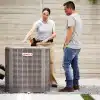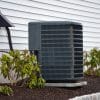If you are new to the construction industry or just became a first-time homeowner, you might find the terms quite confusing such as HVAC and plumbing.
In some other cases when you are choosing your career path and have come across HVAC and Plumbing.
It’s quite basic, but many people have been confused about whether HVAC and plumbing are the same thing.
Let’s dive right into the answer!

Are HVAC and Plumbing the Same Thing?
HVAC and plumbing are not the same thing. They are different trades that deal with different systems in your home or business. HVAC technicians handle heating, cooling, ventilation, and air conditioning systems, while plumbers handle water and gas systems.
Now let’s dig a little deeper into what HVAC and Plumbing actually are, and what the trade professionals do in each of these fields!
What is HVAC?
HVAC stands for heating, ventilation, and air conditioning. An HVAC system handles the air temperature, humidity, and air quality inside a building. They are required for modern buildings and residential homes.
A typical HVAC system includes components such as a furnace or heat pumps used to generate heat, a central air conditioner that cools the air, ducts, and vents for air distribution. Different components can be powered differently. Some may use electricity, while others use natural gas, oil, propane, or even solar energy.
What do HVAC technicians do?
HVAC technicians are professionals that take care of designing, installing, maintaining, repairing, and replacing HVAC systems. They also perform inspections and diagnostics to ensure the systems work properly and efficiently. HVAC technicians need to have knowledge of electrical wiring, piping, refrigeration cycles, air flow, combustion, and safety codes.
Some of the tasks that HVAC technicians do include:
- Designing HVAC systems based on the layout of a building
- Installing new heating and cooling units
- Working with building contractors to install an HVAC system
- Cleaning ducts, and vents, and adjusting filters and coils
- Checking and refilling refrigerant levels
- Testing and calibrating thermostats
- Advising customers on energy-saving tips
What is plumbing?

Plumbing refers to the systems that convey fluids for various purposes such as water supply, drainage, sewage disposal, irrigation, boiling, and fire protection.
Plumbing systems are like HVAC, can be found in residential, commercial, and industrial buildings, and are often required by law.
Plumbing systems consist of various components, such as pipes, valves, faucets, fixtures, appliances, pumps, tanks, heaters, meters, and traps.
What do plumbers do?
Plumbers are trained professionals who install, maintain, repair, replace, and clean drains, pipes, sinks, and anything related to water flow in a building. They also perform inspections and tests to ensure that the systems are working properly and safely. Plumbers need to have knowledge of plumbing codes, materials, water temperature, tools, and techniques.
Some of the tasks that plumbers do include:
- Installing new pipes, valves, faucets, fixtures, appliances, pumps, tanks, heaters, meters, and traps
- Replacing old or damaged parts
- Cleaning and unclogging drains and sewers
- Fixing leaks and bursts
- Adjusting water pressure and temperature
When are plumbing and HVAC installed in new construction?
In new construction, your HVAC and plumbing systems need to be installed before the building is finished but after major setups. Here are when these systems installed:
HVAC
HVAC installation usually occurs after the foundation is poured and the framing of the building is completed, but before the drywall and interior fixtures are installed. This allows the HVAC technicians to install the ductwork, wiring, and components without interfering with other trades or damaging the finished surfaces. Moreover, it also allows the electricians to install the wiring for the HVAC itself in later stages.
Plumbing
Plumbing installation is an intermediate step in new construction. It is important to get it done before installing things like flooring and walls, but after the final framing and roof are completed. This is because plumbing installation requires access to the interior of the walls and floors. Once the walls and floors are installed, it becomes much more difficult to install plumbing fixtures.
The Bottom Line
HVAC and plumbing are not the same thing. HVAC technicians handle anything that relates to the air in a building, while plumbers handle water-related systems.
HVAC and plumbing systems are often interconnected and interdependent and they need to be installed before a building is completed. For example, some HVAC systems use water to heat or cool the air, while some plumbing systems use gas to heat the water. Therefore, HVAC technicians and plumbers may need to work together or coordinate their services to ensure the optimal performance and safety of both systems.



